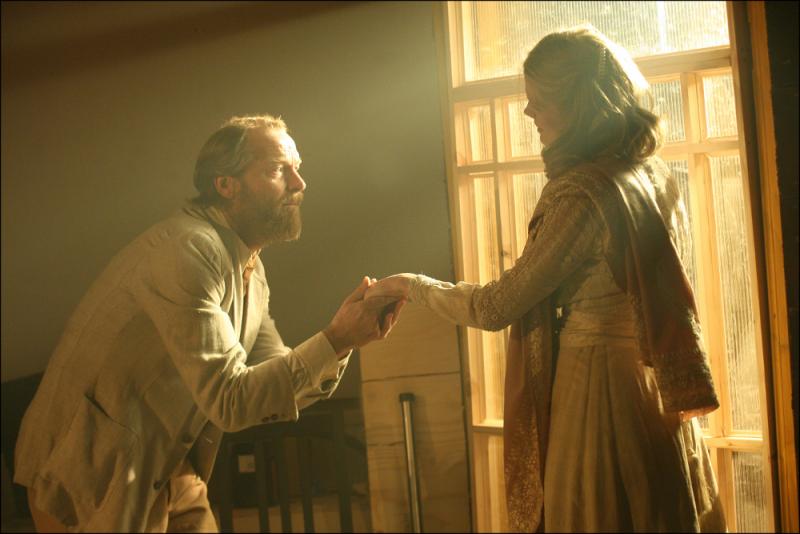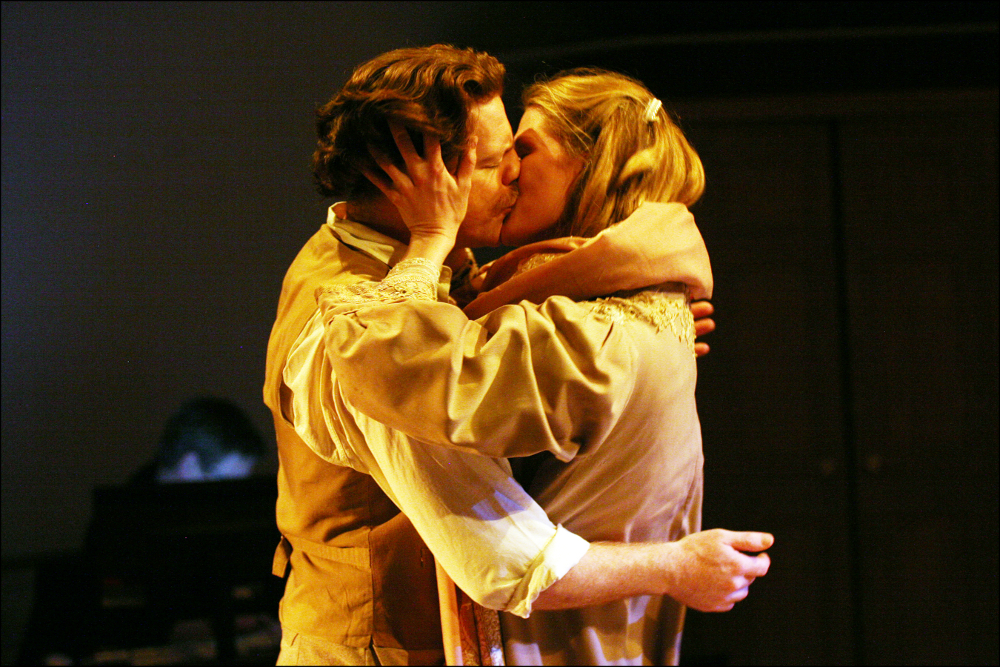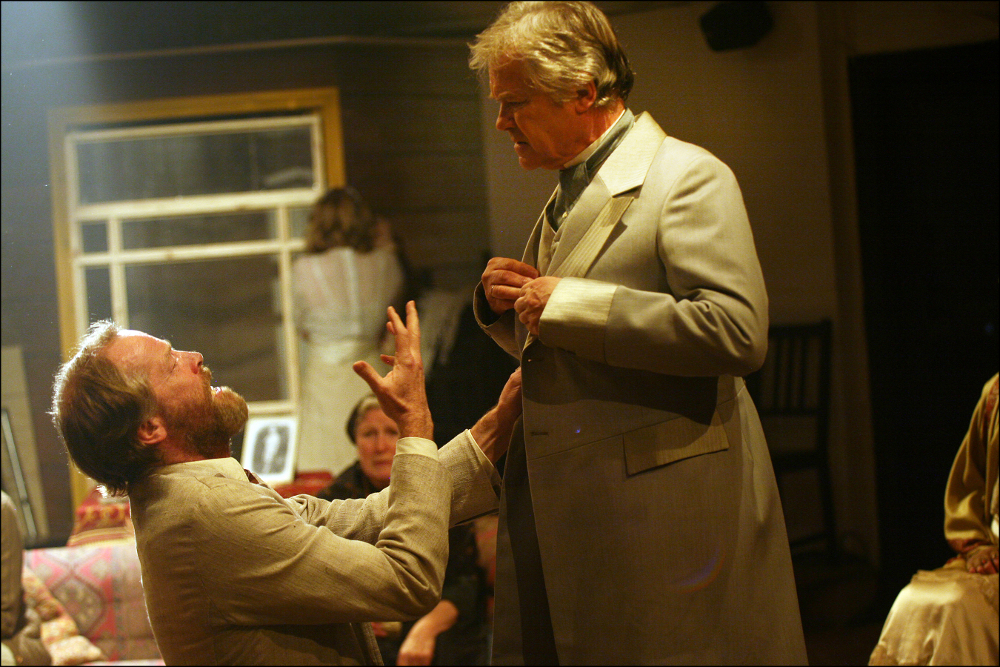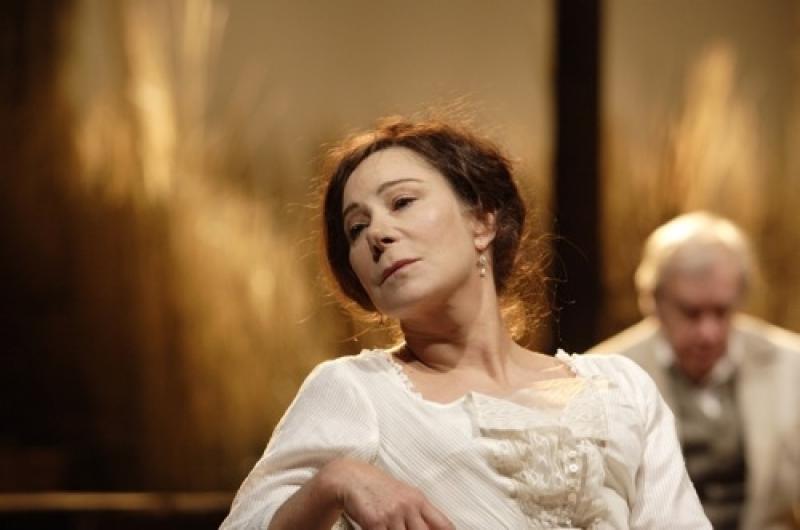Uncle Vanya, The Print Room, London | reviews, news & interviews
Uncle Vanya, The Print Room, London
Uncle Vanya, The Print Room, London
Chekhov at his most tenderly intimate

A play of boundaries, limitations, barriers, one that gazes outwards while never crossing the threshold, Uncle Vanya is often betrayed by the physical space of major stagings. In a new production at Notting Hill’s The Print Room the audience find themselves trapped along with Vanya, Sonya and their dysfunctional family in a single room. Ranged around the four walls we crowd in upon the (in)action, waiting together with the characters for the rupture that will release the tension.
Much of this humour comes from Mike Poulton’s newly revised translation – a work that places its emphasis (at least initially) on the comedy in Chekhov’s tragicomedy. The language is fresh and direct while never feeling that it is dressed in borrowed contemporary clothes. Director Lucy Bailey (co-artistic director of The Print Room) catches Poulton’s vigour, and her cast bat his energetic lines to and fro with all the lively delight of summer afternoon’s game of French cricket.
Bailey’s Uncle Vanya is foremost a tale of men – of male friendship and enmity
Which isn’t to say that the we lose the classical proportions of the play. Restraint and balance are all here to be found, heightened by Poulton’s sharper angles and Bailey’s swifter timing.
William Dudley’s set places us in the all-purpose interior of the family farm, the anarchic clusters of chairs, tables and sofas mirrored in the disparate characters who must inhabit this shared space. Set-changes are scored to a clamour of bells, horses-hooves on cobbles, shouting, while carefully choreographed furniture-removal becomes a dance. Yet such demonstrative shifts only serve to stress the stasis of the play; noise and rush there may be but it remains elsewhere, beyond the four walls that still enclose us each time the lights come up on a new scene.
 While neither the love stories nor the social commentary are neglected, Bailey’s Uncle Vanya is foremost a tale of men – of male friendship and enmity. William Houston’s Astrov (pictured right with Lucinda Millward as Yelena) is a physical force on stage, all restless wit and misguided passion, and it is his fractious devotion to Vanya (Iain Glen) that anchors the relationships with Sonya and Yelena – this latter rather more substantial than usual thanks to Houston’s forceful courtship.
While neither the love stories nor the social commentary are neglected, Bailey’s Uncle Vanya is foremost a tale of men – of male friendship and enmity. William Houston’s Astrov (pictured right with Lucinda Millward as Yelena) is a physical force on stage, all restless wit and misguided passion, and it is his fractious devotion to Vanya (Iain Glen) that anchors the relationships with Sonya and Yelena – this latter rather more substantial than usual thanks to Houston’s forceful courtship.
Casting Glen against type as the sardonic, shabby Vanya rather than the doctor proves inspired. Glen (looking like a grubbier Van Gogh, with battered beard and linen jacket) makes much of his character’s restlessness – sitting, speaking and gesturing with an urgency that only find its outlet in the cruelty of his humour. All bristles and emotional scabs, Glen’s Vanya rubs with delicious brutality against David Yelland’s Serebryakov (pictured below with Glen). In Poulton’s hands the professor’s dialogue is as smooth as his suits, and this elegant fraud (“scattering academic dust on the shelves of oblivion”) makes a fine villain.
 It is luxury to see this kind of casting up close – the sublimated rage of the drinking scene, Vanya’s eventual release and frenzy – as though you’re standing in the wings of the National Theatre. And the women are no less strong, from Marlene Sidaway’s Marina, convinced that a cup of tea can solve any crisis, to stiffly matriarchal Maria Vasilyevna (Caroline Blackiston) who clings to her jewels and her dignity even as her family collapses around her.
It is luxury to see this kind of casting up close – the sublimated rage of the drinking scene, Vanya’s eventual release and frenzy – as though you’re standing in the wings of the National Theatre. And the women are no less strong, from Marlene Sidaway’s Marina, convinced that a cup of tea can solve any crisis, to stiffly matriarchal Maria Vasilyevna (Caroline Blackiston) who clings to her jewels and her dignity even as her family collapses around her.
At the centre we have the opposition of Charlotte Emmerson’s wistful Sonya and the caged beauty of Yelena (Lucinda Millward), a partnership coloured by an unusually touching midnight scene of friendship – quite the match for the men’s earlier drunken camaraderie. If Millward remains inscrutable to the end, her calculated withholding is balanced by the directness of Emmerson’s closing speech. As clean-scrubbed and unpretending as her appearance, it cut through the baroque clamour of the earlier comedy, recalling us to the quiet tragedy that must be at the core of any truthful Uncle Vanya.
This first foray into classic drama sees the tiny Print Room extending both its reach and its grasp. Heavyweight casting and light directorial touch make this a Chekhov well worth venturing out of the West End for.
MORE CHEKHOV ON THEARTSDESK
The Cherry Orchard, National Theatre (2011). Zoë Wanamaker (pictured below) shines in Howard Davies's murky production of Chekhov
The Cherry Orchard, Sovremennik, Noël Coward Theatre (2011). Russians soar in third, and final, offering of their first-ever London season
A Provincial Life, National Theatre Wales (2012). Moments of visual beauty punctuate a Chekhov adaptation that struggles to find its focus
Three Sisters, Young Vic (2012) Benedict Andrews' energetic update is stronger on ensemble work than individual performances
 Uncle Vanya, Vakhtangov Theatre Company (2012). Anti-naturalistic Russian Chekhov buries humanity under burlesque and mannerism
Uncle Vanya, Vakhtangov Theatre Company (2012). Anti-naturalistic Russian Chekhov buries humanity under burlesque and mannerism
Uncle Vanya, Vaudeville Theatre. Anna Friel, Laura Carmichael and Ken Stott shine bright in Lindsay Posner's production of Chekhov's drama
Longing, Hampstead Theatre (2013). William Boyd's dramatisation of two Chekhov stories with Iain Glen and Tamsin Greig is more pleasant than towering
The Cherry Orchard, Young Vic (2014). Katie Mitchell delivers Chekhov's masterpiece with devastating power
Uncle Vanya/Three Sisters, Wyndham's Theatre (2014). Quiet truth in finely observed ensemble Chekhov from the Mossovet State Academic Theatre
Winter Sleep. Turkish master Nuri Bilge Ceylan’s Cannes Palme d'Or winner, based on Chekhov short stories, is huge in every sense
The Seagull, Regent's Park Open Air Theatre (2015). Strikingly staged Chekhov continues a strong season in the park
Uncle Vanya, Almeida Theatre (2016). Robert Icke's lengthy Chekhov revival/reappraisal is largely a knockout
Young Chekhov, National Theatre (2016). Jonathan Kent's three-play Chekhovathon builds to a shattering climax
Wild Honey, Hampstead Theatre (2016). Early Chekhov begins strongly then falls away
more Theatre
 Banging Denmark, Finborough Theatre review - lively but confusing comedy of modern manners
Superb cast deliver Van Badham's anti-incel barbs and feminist wit with gusto
Banging Denmark, Finborough Theatre review - lively but confusing comedy of modern manners
Superb cast deliver Van Badham's anti-incel barbs and feminist wit with gusto
 London Tide, National Theatre review - haunting moody river blues
New play-with-songs version of Dickens’s 'Our Mutual Friend' is a panoramic Victori-noir
London Tide, National Theatre review - haunting moody river blues
New play-with-songs version of Dickens’s 'Our Mutual Friend' is a panoramic Victori-noir
 Machinal, The Old Vic review - note-perfect pity and terror
Sophie Treadwell's 1928 hard hitter gets full musical and choreographic treatment
Machinal, The Old Vic review - note-perfect pity and terror
Sophie Treadwell's 1928 hard hitter gets full musical and choreographic treatment
 An Actor Convalescing in Devon, Hampstead Theatre review - old school actor tells old school stories
Fact emerges skilfully repackaged as fiction in an affecting solo show by Richard Nelson
An Actor Convalescing in Devon, Hampstead Theatre review - old school actor tells old school stories
Fact emerges skilfully repackaged as fiction in an affecting solo show by Richard Nelson
 The Comeuppance, Almeida Theatre review - remembering high-school high jinks
Latest from American penman Branden Jacobs-Jenkins is less than the sum of its parts
The Comeuppance, Almeida Theatre review - remembering high-school high jinks
Latest from American penman Branden Jacobs-Jenkins is less than the sum of its parts
 Richard, My Richard, Theatre Royal Bury St Edmund's review - too much history, not enough drama
Philippa Gregory’s first play tries to exonerate Richard III, with mixed results
Richard, My Richard, Theatre Royal Bury St Edmund's review - too much history, not enough drama
Philippa Gregory’s first play tries to exonerate Richard III, with mixed results
 Player Kings, Noel Coward Theatre review - inventive showcase for a peerless theatrical knight
Ian McKellen's Falstaff thrives in Robert Icke's entertaining remix of the Henry IV plays
Player Kings, Noel Coward Theatre review - inventive showcase for a peerless theatrical knight
Ian McKellen's Falstaff thrives in Robert Icke's entertaining remix of the Henry IV plays
 Cassie and the Lights, Southwark Playhouse review - powerful, affecting, beautifully acted tale of three sisters in care
Heart-rending chronicle of difficult, damaged lives that refuses to provide glib answers
Cassie and the Lights, Southwark Playhouse review - powerful, affecting, beautifully acted tale of three sisters in care
Heart-rending chronicle of difficult, damaged lives that refuses to provide glib answers
 Gunter, Royal Court review - jolly tale of witchcraft and misogyny
A five-women team spell out a feminist message with humour and strong singing
Gunter, Royal Court review - jolly tale of witchcraft and misogyny
A five-women team spell out a feminist message with humour and strong singing
 First Person: actor Paul Jesson on survival, strength, and the healing potential of art
Olivier Award-winner explains how Richard Nelson came to write a solo play for him
First Person: actor Paul Jesson on survival, strength, and the healing potential of art
Olivier Award-winner explains how Richard Nelson came to write a solo play for him
 Underdog: the Other, Other Brontë, National Theatre review - enjoyably comic if caricatured sibling rivalry
Gemma Whelan discovers a mean streak under Charlotte's respectable bonnet
Underdog: the Other, Other Brontë, National Theatre review - enjoyably comic if caricatured sibling rivalry
Gemma Whelan discovers a mean streak under Charlotte's respectable bonnet
 Long Day's Journey Into Night, Wyndham's Theatre review - O'Neill masterwork is once again driven by its Mary
Patricia Clarkson powers the latest iteration of this great, grievous American drama
Long Day's Journey Into Night, Wyndham's Theatre review - O'Neill masterwork is once again driven by its Mary
Patricia Clarkson powers the latest iteration of this great, grievous American drama

Add comment